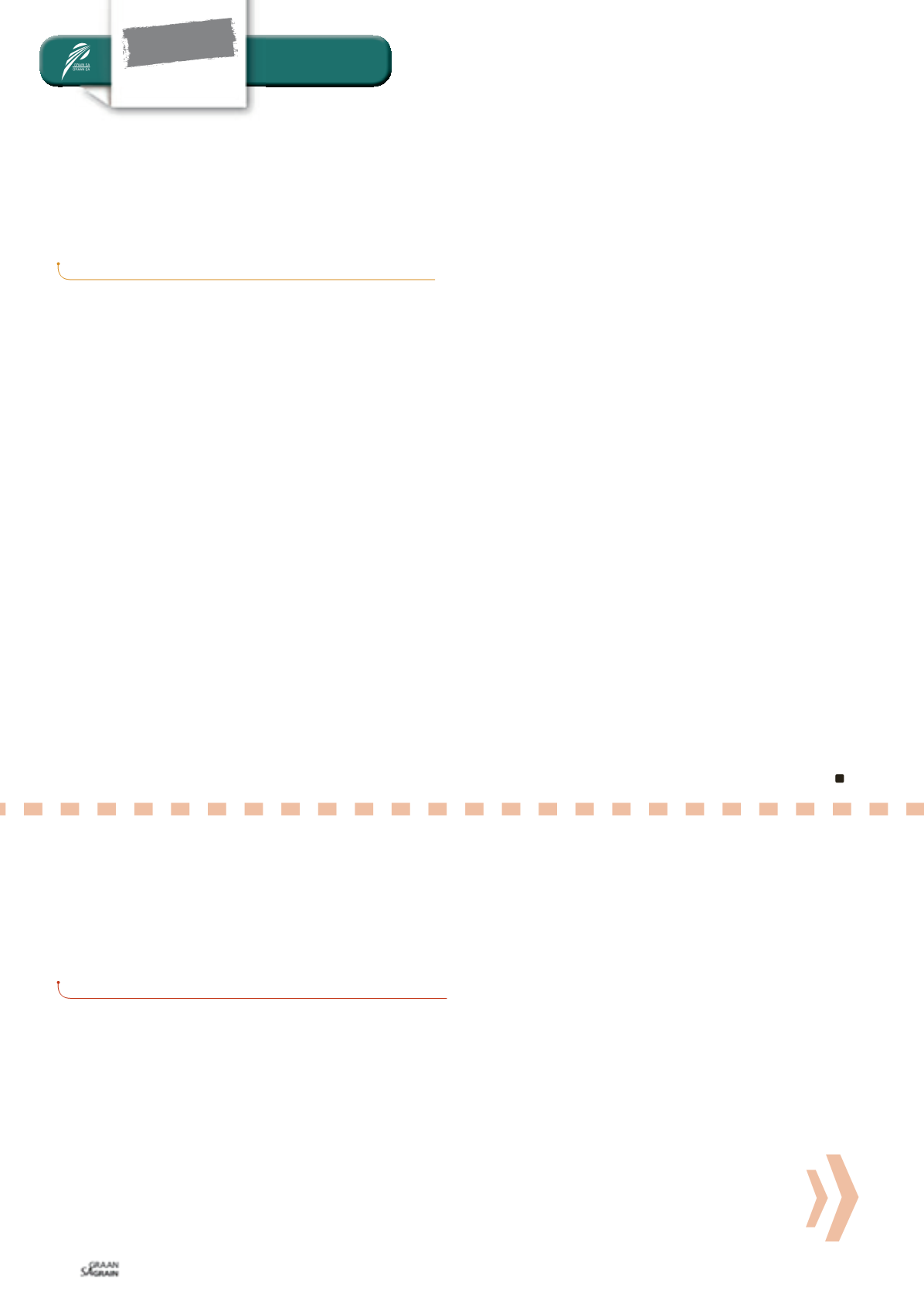
FOCUS
Seed
Special
Maart 2014
58
Seed treatments play a critical part in
sustainable grain production
WEMA provides additional tools to help
improve
food security
A
ccording toMonsanto South Africa,
the pre-plant treatment of seed
with a range of beneficial products
plays a critical part in sustainable
and successful grain production. Successful
and sustainable grain production relies on
three main factors.
Firstly using good genetics that is genetically
best adapted to the conditions; high
yielding is of utmost importance. Secondly
using technology in terms of biotechnology
as well as using hybrids that inherently have
beneficial genetic traits such as tolerance to
certain insects and herbicides. Thirdly there
are agricultural systems – basically implying
doing the correct “thing” at the correct time
and in the correct place.
This includes good and reliable recom-
mendations, precision farming techniques
and adding value by using the correct weed
control and applying seed treatment to
protect seed and to add benefits that can
increase yields.
One of the most important factors of a
successful grain harvest is establishing the
correct plant population and maintaining
it. Considering that the seed and seedling
is the most vulnerable stage of your crop,
it is important to protect it from damage
by all means possible. Using a package of
approved seed treatment products on your
seed can protect your seed and seedling
from insect damage, fungal infections,
disease as well as nematodes.
Using the correct and approved seed
treatments can not only protect your
germinating, but it can also improve the
vigour of the seedling. Different seed
treatment products provide different
periods of protection, some treatments can
protect the crop against disease and insect
damage up until maturity. Treating the seed
pre-plant is the best, safest and most direct
way of getting beneficial chemicals and
biologicals into the zone of germination and
rhizosphere (root zone).
It is very important when considering
seed treatment options, to always use only
registered and approved products. The best
approach is to obtain already treated seed
from your seed company, where it is treated
professionally, under highly regulated,
controlled and safe conditions.
These professionally treated seeds also
have the correct polymer coatings to
prevent dust when handling the seed during
planting. Some seed treatment products can
have a negative effect on human health and
the environment when handled in the wrong
way, safety is therefore very important
when considering on-farm treatments and
for the handling of the treated seed during
planting. It is also very important to store
treated seed under the correct and safe
conditions and to dispose of the empty seed
bags and chemical containers in a correct
and safe manner.
Monsanto can supply producers with a
complete package of seed treatments for
their maize seed. These seed treatments are
not only able to protect the seed and plant
against certain fungal infections, insects
and disease, but it can also improve the
seedling vigour and protect the seedling
against nematode damage. In the near
future, Monsanto will provide farmers with
different seed treatment package options
to address the specific seed treatment
needs of the farmers. We will also see the
introduction of more treatment products
with a biological approach, using beneficial
living micro-organisms, to protect the
seedlings and improve vigour while also
improving the overall health of the soil.
Product information
Product information
PIETER SMIT,
product manager: Seed and Traits, Monsanto South Africa
M
aize is the most widely grown staple crop in Africa, with
more than 300 million people depending on it as their
main food source every day. Half of all global population
growth between now and 2050 will likely take place in
Africa and according to the United Nations, the continent’s popula-
tion could more than double by mid-century, to 2,4 billion people.
Natural phenomena such as droughts, crop diseases and insect
pests are however making crop production quite difficult on the con-
tinent. These disasters had a significant impact in many countries in
2013 and caused yield losses in maize in many parts of sub-Saharan
Africa, leading to supply shortages.
Agricultural technology can help smallholder farmers in Africa in-
crease their income and improve their yields, thus meeting the
challenges of crop production and managing risks so that they can
achieve self-sufficiency and even prosperity. Commercial approach-
es are the most sustainable in meeting farmers’ needs; but today
many African farmers have needs that can’t be met through commer-
cial channels. A more developmental approach is adopted, where
farmers are assisted to move from subsistence farming to commer-
cial farming. Appropriate farming solutions for seed, fertiliser, train-
ing, microcredit and marketing support, are provided to them by a
consortium of partners.
Monsanto is a technology provider in several such collaborations. In
special situations where a humanitarian approach is best, the Mon-
santo fund, the charitable division of the company, provides finan-
cial support to community projects focused on improving nutrition
through increased agricultural productivity.
MAGDA DU TOIT,
corporate communication manager, Monsanto SS Africa


